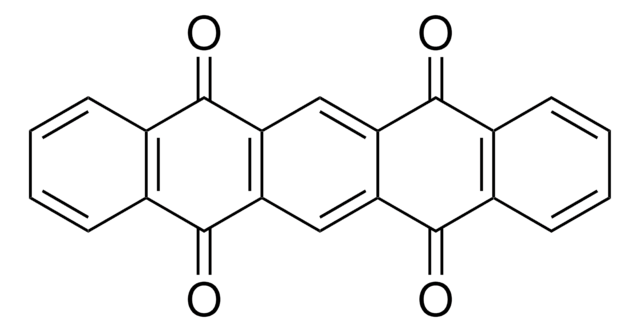113700
4,4′-Dichlorobenzophenone
99%
Synonym(s):
4,4′-DBP
Sign Into View Organizational & Contract Pricing
All Photos(1)
About This Item
Linear Formula:
(ClC6H4)2CO
CAS Number:
Molecular Weight:
251.11
Beilstein:
643345
EC Number:
MDL number:
UNSPSC Code:
12352100
PubChem Substance ID:
NACRES:
NA.22
Recommended Products
Quality Level
Assay
99%
form
solid
bp
353 °C (lit.)
mp
144-146 °C (lit.)
SMILES string
Clc1ccc(cc1)C(=O)c2ccc(Cl)cc2
InChI
1S/C13H8Cl2O/c14-11-5-1-9(2-6-11)13(16)10-3-7-12(15)8-4-10/h1-8H
InChI key
OKISUZLXOYGIFP-UHFFFAOYSA-N
Looking for similar products? Visit Product Comparison Guide
General description
4,4′-Dichlorobenzophenone (DBP) is a metabolite obtained when one strain of ectomycorrhizal fungi, Xerocomus chrysenteron, degrades 1,1,1-trichloro-2,2-bis(4-chlorophe-nyl) ethane (DDT).
Storage Class Code
11 - Combustible Solids
WGK
WGK 3
Personal Protective Equipment
dust mask type N95 (US), Eyeshields, Gloves
Certificates of Analysis (COA)
Search for Certificates of Analysis (COA) by entering the products Lot/Batch Number. Lot and Batch Numbers can be found on a product’s label following the words ‘Lot’ or ‘Batch’.
Already Own This Product?
Find documentation for the products that you have recently purchased in the Document Library.
Customers Also Viewed
Yi Huang et al.
Chemosphere, 92(7), 760-764 (2013-05-09)
One strain of ectomycorrhizal fungi, Xerocomus chrysenteron, had been investigated for its ability to degrade 1,1,1-trichloro-2,2-bis(4-chlorophe-nyl) ethane (DDT) by measuring unlabeled DDT and identifying its metabolites, and determining the mineralization of [(13)C]DDT in pure cultures. After 45d incubation, about 55%
C J Moudgal et al.
Environmental science & technology, 37(22), 5228-5235 (2003-12-06)
As part of the EPA's mission to protect the environment, chemicals of concern (CoCs) at Superfund or other hazardous waste sites are cleaned up based on their potential toxicity to humans and the surrounding ecosystem. Oftentimes, there is a lack
[Comitogenic and immunosuppressant action of p,p-DDT and its derivatives on phytohemagglutinin-stimulated human lymphocytes].
I S Nikolaeva et al.
Doklady Akademii nauk SSSR, 253(2), 503-505 (1980-01-01)
J A Bumpus et al.
Applied and environmental microbiology, 53(9), 2001-2008 (1987-09-01)
Extensive biodegradation of 1,1,1-trichloro-2,2-bis(4-chlorophenyl)ethane (DDT) by the white rot fungus Phanerochaete chrysosporium was demonstrated by disappearance and mineralization of [14C]DDT in nutrient nitrogen-deficient cultures. Mass balance studies demonstrated the formation of polar and water-soluble metabolites during degradation. Hexane-extractable metabolites identified
M Fernández et al.
Chemosphere, 41(6), 801-812 (2000-06-23)
A study into levels of contamination by organochlorine compounds (insecticides and PCBs) and heavy metals (Cd and Pb) in the water/sediment system of the Southeast Regional Park (SERP) in Madrid, Spain, has been carried out. Residue levels of xenobiotics were
Our team of scientists has experience in all areas of research including Life Science, Material Science, Chemical Synthesis, Chromatography, Analytical and many others.
Contact Technical Service








